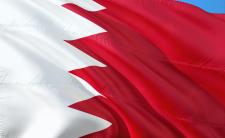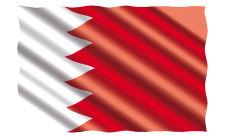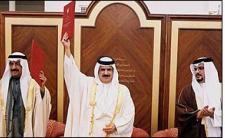Introduction
The Kingdom of Bahrain covers 36 Persian Gulf islands off the east coast of Saudi Arabia. These islands make up only 760 square kilometres, but Bahrain is one of the most densely populated nations in the world. This ancient island paradise and trading centre is home to over 1.2 million people, mostly Shi’a Muslim Arabs, though there is a powerful Sunni Muslim Arab minority. While the capital of Manama has a population of only 163,000 people, 89% of the Bahraini people live in urban centres situated throughout the islands.
Political and historical developments
Like many of its neighbouring Middle Eastern countries, Bahrain was ruled by a series of conquering nations, including the Assyrians, the Babylonians, and the Greeks. The Persians took control of the country in the 4th century A.D., and their rule lasted until the Portuguese invaded in 1515. While the Persians were able to regain their control of Bahrain in 1602, the Al Khalifa family of the Sunni Bani Utbah tribe rose up in 1783 and Shaikh Ahmed Al-Fateh became the first of the Al Khalifa rulers. This family continues to rule Bahrain to this day.
Regional struggles led the Al Khalifa to sign a protectorate treaty with Great Britain in 1820. After oil was discovered in the region in the 1930s, the British moved their main military base to the islands, a relationship that lasted until 1968 when Britain decided to end its protectorate agreements in the Persian Gulf. After a failed attempt to create a union of Arab emirates, Bahrain was forced to declare independence on 15 August 1971. The first constitution of the now independent State of Bahrain was promulgated in 1973. It created an advisory legislative body (the National Assembly) and a 14 royally appointed Cabinet of Ministers, but the Amir disbanded the National Assembly in 1975 when it attempted to end of the Al Khalifa rule. The Amir removed all of the sections dealing with legislative power from the constitution and continued to rule mainly unchallenged. The Iranian revolution of 1979, however, changed the social dynamic in Bahrain. The Shi’a majority was empowered and encouraged by Ayatollah Khomeini’s Iran, while the fall of the Shah greatly weakened the Sunni cultural and religious authority throughout the Middle East.
The Shi’a community began to agitate for more democratic representation over growing frustration with Sunni political dominance. After a series of violent clashes, the government responded by changing the Cabinet for the first time in 20 year. In 1995, the Consultative Council, created to advise and, in special circumstances, draft legislation, was expanded from 30 to 40 members. These efforts proved too little, as a series of bombings in the following year resulted in several fatalities. The government resulted with over 1,000 arrests, detaining political opponents and people connected to the violence. This tense situation continued until Shaikh Hamad bin Isa Al Khalifa replaced his father Shaikh Isa bin Hamad Al Khalifa in 1999. The new ruler constituted a committee during his first year in order to transform Bahrain into a constitutional monarchy. In the first national vote since the 1970s, the public overwhelmingly voted in favour of the referendum instituting the resulting National Action Charter in February 2001. The Shaikh also released all political prisoners and detainees. On 14 February 2002, Shakih Hamad officially proclaimed Bahrain a constitutional monarchy, with himself as king.
2002 Constitution
The 2002 Constitution of the Kingdom of Bahrain recognizes the country’s Islamic faith by placing Islamic Shariah law as its principle source for legislation. It also affirms that the goal of the state is to advance the interests of the larger Islamic community, but it also guarantees freedom of religion, expression, and the press. It creates a government with powers divided among the King, the Prime Minister, the Council of Ministers, a bicameral National Assembly, and a Constitutional Court.
Executive branch
The King maintains broad powers under the Constitution. The monarchy is hereditary, passed from father to eldest son. As the Head of State, it is the King’s duty to uphold the Constitution and the sovereignty of Bahrain, to award honours and decorations, to grant pardons, and to appoint and dismiss the Prime Minister, Ministers, judges, civil and military officials, ambassadors, and the Consultative Council. He also acts as the Commander-in-Chief of the Armed Forces. However, the King’s most important powers are his legislative powers. He has the ability to ratify constitutional amendments, propose legislation, and veto laws. His veto of a law can only be overcome by a majority vote of the legislature. He also has the ability to declare war and a state of emergency, as well as the power to conclude treaties. The King is assisted in his duties by a Council of Ministers chaired by the Prime Minister. The Prime Minister is appointed by the King, and the Ministers are appointed by the King on advice from the Prime Minister. It is the duty of the Council to supervise the activities of the government agencies and to implement national policy. Removal of the Ministers and the Prime Minister is conducted by the King, though if the Prime Minister is removed or resigns, the entire Council is considered resigned as well.
Legislative branch
The National Assembly of Bahrain is divided between the Consultative Council and the Chamber of Deputies. The Council is composed of 40 royally appointed members who serve for 4 years, subject to reappointment. The Chamber likewise has 40 members who serve 4 year terms, but its members are elected by a direct vote. When the new constitution was proposed, the King gained support for the 2001 referendum from the Shi’a majority leaders by promising that the appointed Consultative Council would have only advisory powers, but when the actual governing document was released in 2002, both houses had legislative powers. In order for a bill to become a law, it has to be approved by both the Council and the Chamber and ratified by the King. However, the Chamber does possess some specific powers, including the power of interpellation and the passage of a vote of no-confidence against any Minister or the Council of Ministers as a whole. The Chamber may not pass a vote of no-confidence against the Prime Minister directly. If two-thirds of its members believe that they cannot work with the Prime Minister, then it is put to a vote in the entire National Assembly, and if they decide by a two-thirds vote that they cannot work with the Prime Minister, then the matter is submitted to the King who must decide whether to replace the Prime Minister or the Chamber of Deputies.
Judicial branch
The judicial power of Bahrain is divided among a number of lower courts created by law, including military, civil, and religious courts using Islamic law. This system is regulated and overseen by a Higher Judicial Council, chaired by the King, which is tasked with ensuring the functioning of the courts and the Public Prosecution Office. The highest appellate court is the High Civil Appeals Court, though the Constitution does provide for a Constitutional Court as well. The Constitutional Court is comprised of a President and 6 other members appointed by the King on the recommendation of the Higher Judicial Council. It is their task to makes sure that all laws are constitutional as requested by Government, the Consultative Council, or the Chamber of Deputies. The King may also ask the Court to review a law before it is passed. Members of the Court cannot be dismissed.
Political challenges
Bahrain continues to face popular demands for increased democratization, which has manifested itself in protests and uprisings around the country. Due to the King’s reneging on his promise to keep the appointed Consultative Council in an advisory position, many Shi’a Muslims boycotted the first elections held under the Constitution in 2002. While they participated in the 2006 and 2010 elections, resulting in a win for the largest Shi’a political Society, Al Wifaq, the Shi’a population continues to demand increased powers for the elected Chamber of Deputies and more representation in the government. Bahrain was caught in the tide of the so-called Arab Spring of 2011 in which several countries in the Middle East and North Africa saw a rise in popular protests. That same year, Shi’a protestors in Bahrain began a popular movement demanding a new constitution, a release of political prisoners, and an end to discriminatory policies favouring Sunnis in education, health care, and the government, as well as the creation of a regulatory body that could investigate corruption. Some called for the end of the monarchy entirely, in favour of a completely elected government. The government responded in an effort to disband the protests, including the use of tear gas and rubber bullets. After government forces opened fire on a crowd of mourners at the funeral of a protestor, Al Wifaq withdrew from the National Assembly. Tensions further increased when protestors took control of the Pearl Roundabout in the capital, prompting government forces to send security forces to retake the area. The King eventually was forced to release some political prisoners and fire some government officials, but protests continued in dissatisfaction over this response. Despite a dialogue between the opposition and Crown Prince Salman bin Hamad Al Khalifa, negotiations have stalled and the King called in troops from the Gulf Cooperation Council and declared a state of emergency.
System of government under 2002 Constitution
Timeline
| 1515 | Portuguese invade the islands of Bahrain |
| 1602 | Persians oust Portuguese to take over Bahrain |
| 1783 | Al Khalifa family takes control of the country from the occupying Persians |
| 1820 | Al Khalifa signs protectorate treaty with the British |
| 1931 | Oil discovered in Bahrain, British move their main regional naval base to the islands |
| 1968 | Britain ends its protectorate over the Persian Gulf States, Bahrain attempts to form a union of Arab emirates |
| 15 August 1971 | Bahrain declares independence |
| 1972 | Elections held for a Constituent Assembly |
| 1973 | First constitution promulgated |
| 1975 | Amir disbands the National Assembly when they attempt to remove him from power and get rid of American naval bases on the islands |
| 1979 | Iranian revolution energizes the Shi’a majority |
| 1981 | Islamic Front for the Liberation of Bahrain stages unsuccessful coup |
| 1991 | Bahrain participates in US-led coalition’s Operation Desert Storm after Iraq invades Kuwait |
| 1992 | 30 member Consultative Council appointed by the Amir |
| 1995 | Amir changes the government in response to growing popular discontent from the Shi’a community |
| 1996 | A series of bombings on restaurants and hotels in the capital results in over 1,000 government arrests |
| 1999 | Shaikh Hamad bin Isa Al Khalifa replaces his father Shaikh Isa bin Hamad Al Khalifa, establishes a committee to create a constitutional monarchy |
| 2000 | Amir appoints non-Muslims and women to the Consultative Council for the first time |
| February 2001 | National referendum votes in overwhelming favour of the new constitution, the National Action Charter, Shaikh releases all political prisoners |
| 14 February 2002 | Shaikh Hamad officially proclaims Bahraini constitutional monarchy with himself as King, four main Shi’a political groups boycott the election calling for increased powers for the elected house of the new legislature |
| 2005 | Popular protests demanding a fully-elected legislature |
| 2006 | Second set of elections under the 2002 Constitution results in a victory for the Shi’a party Al Wifaq, women allowed to participate for the first time |
| 2011 | Popular protests by Shi’a majority calling for increased democratic representation, an end to discrimination in favour of Sunnis, the release of political prisoners, and the creation of an anti-corruption watchdog agency lead to government suppression and the declaration of a state of emergency |
Bibliography
- United States. CIA World Factbook: Bahrain. , 2011. Web. 8 Jul 2011.
- "Bahrain Country Profile." 04/06/2011. BBC News. Web. 8 Jul 2011.
- United States Department of State. Background Note: Bahrain. , 2011. Web. 29 Jun 2011.
- "Constitution of Bahrain." University of Richmond Constitution Finder. Web. 8 Jul 2011.
- Dabrowska, Karen. Bahrain Briefing: The Struggle for Democracy. London, UK: Colourmast Limited, 1997. Print.
| Branch | Hierarchy | Appointment | Powers | Removal |
|---|



Share this article